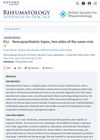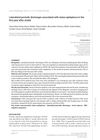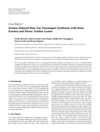 1 citations,
February 1999 in “Journal of Paediatrics and Child Health”
1 citations,
February 1999 in “Journal of Paediatrics and Child Health” The document concludes that each reviewed medical book is useful for its specific area in pediatric care, especially the "Neonatal Formulary" for neonatal drug information.

The trial aims to understand how obesity and lifestyle affect circadian rhythms in people with schizophrenia and bipolar disorder.

Lower LDL-c levels predict higher COVID-19 mortality.
[object Object]  April 2017 in “European Psychiatry”
April 2017 in “European Psychiatry” An older woman had false beliefs after taking a depression medication, which stopped when she stopped the medication.
 426 citations,
August 2014 in “Nature Medicine”
426 citations,
August 2014 in “Nature Medicine” Skin stem cells interacting with their environment is crucial for maintaining and regenerating skin and hair, and understanding this can help develop new treatments for skin and hair disorders.
 November 2024 in “Rheumatology Advances in Practice”
November 2024 in “Rheumatology Advances in Practice” A thorough, team-based approach and clear communication improve outcomes in complex neuropsychiatric lupus cases.
38 citations,
February 2021 in “Journal of Investigative Dermatology” Aging slows wound healing due to weaker cells and immune response.
2 citations,
January 2024 in “Pharmaceuticals” Deep eutectic solvents are eco-friendly and effective for extracting useful pharmaceutical compounds.

Intermittent fasting slows hair growth by damaging hair follicle cells.
November 2005 in “Physiology” Apoptosis, not oxidative stress, is linked to aging in mice with mtDNA mutations.
 March 2014 in “Fertility and Sterility”
March 2014 in “Fertility and Sterility” The April 2014 issue of "Fertility and Sterility" discussed various reproductive health topics, including hormone therapy benefits, sperm and genetic factors in male infertility, and the link between PCOS and diabetes.
 July 1996 in “Annals of Internal Medicine”
July 1996 in “Annals of Internal Medicine” Taking high doses of fluconazole for a long time can cause reversible hair loss.
 9 citations,
June 2002 in “Best Practice & Research in Clinical Obstetrics & Gynaecology”
9 citations,
June 2002 in “Best Practice & Research in Clinical Obstetrics & Gynaecology” Testosterone therapy can help women with androgen deficiency by improving energy, sex drive, and bone health with few side effects.
 3 citations,
June 2015 in “Serbian Journal of Dermatology and Venereology”
3 citations,
June 2015 in “Serbian Journal of Dermatology and Venereology” The conclusion is that cerebrovascular diseases can cause seizure-like activity in stroke patients, which can be improved with antiepileptic drugs.
19 citations,
May 2020 in “American journal of men's health” Testosterone therapy helps boys with hormone deficiencies develop normal male characteristics and grow properly.
 59 citations,
August 2004 in “Human Reproduction Update”
59 citations,
August 2004 in “Human Reproduction Update” Testosterone replacement can help women with low libido and mood, but they need to have enough estrogen first to avoid side effects.
 11 citations,
September 2020 in “OncoTargets and Therapy”
11 citations,
September 2020 in “OncoTargets and Therapy” Dihydrotestosterone increases growth and spread of human brain cancer cells, and blocking its formation might help treat this cancer.
 2 citations,
April 2016 in “The Journal of Urology”
2 citations,
April 2016 in “The Journal of Urology” Finasteride 1mg linked to diverse symptoms; other treatments improve erectile function in rats.
 January 2024 in “International journal of yogic, human movement and sports sciences”
January 2024 in “International journal of yogic, human movement and sports sciences” Yoga Nidra improves well-being and reduces anxiety in women with PCOS.
[object Object]  7 citations,
January 2014 in “Case reports in pediatrics”
7 citations,
January 2014 in “Case reports in pediatrics” A baby's toe was severely damaged by a hair tourniquet, leading to bone and tendon damage, but improved after surgery and treatment.
 May 2019 in “bioRxiv (Cold Spring Harbor Laboratory)”
May 2019 in “bioRxiv (Cold Spring Harbor Laboratory)” Testosterone significantly affects urination differences between male and female mice.
 61 citations,
April 2014 in “The Journal of Steroid Biochemistry and Molecular Biology”
61 citations,
April 2014 in “The Journal of Steroid Biochemistry and Molecular Biology” Finasteride affects brain and blood steroids, causing lasting sexual and emotional side effects.
 45 citations,
February 2019 in “Journal of Affective Disorders”
45 citations,
February 2019 in “Journal of Affective Disorders” Melatonin improved mental health and metabolism in women with PCOS.
 26 citations,
May 2014 in “BioEssays”
26 citations,
May 2014 in “BioEssays” Using neurohormones to control keratin can lead to new skin disease treatments.
 9 citations,
April 2018 in “Journal of trace elements in medicine and biology”
9 citations,
April 2018 in “Journal of trace elements in medicine and biology” Hair analysis can show nutritional status and environmental exposure, with phosphorus being very stable in hair and differences found based on gender and conditions like depression and autism.
 5 citations,
May 2023 in “Frontiers in immunology”
5 citations,
May 2023 in “Frontiers in immunology” Environmental factors like diet and vitamin levels, especially Vitamin D, can affect autoimmune diseases differently, with lifestyle changes potentially improving outcomes.
 2 citations,
September 2017 in “Archives of Medical Science”
2 citations,
September 2017 in “Archives of Medical Science” Finasteride affects offspring's antioxidant enzymes in epididymis, possibly disrupting sperm maturation.
 January 2015 in “Springer eBooks”
January 2015 in “Springer eBooks” Some alternative treatments may help with hair loss, but more evidence is needed to confirm their effectiveness.
 10 citations,
January 2023 in “Journal of the European Academy of Dermatology and Venereology”
10 citations,
January 2023 in “Journal of the European Academy of Dermatology and Venereology” Alopecia areata greatly affects people's life quality, mental health, and work life.
 June 2023 in “Journal of Education, Health and Sport”
June 2023 in “Journal of Education, Health and Sport” CBD is effective for certain epilepsy conditions, shows promise for other health issues, but needs more research for safety and effectiveness.


























